

Strategic resilience during the COVID-19 crisis. As we approach the one-year mark of the global coronavirus crisis, it is heartening to see that many organizations have stepped up to the challenge, adapting their businesses both to protect their employees and to continue serving their customers and communities.
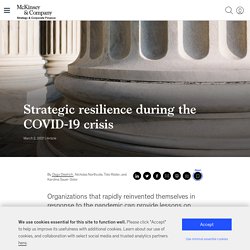
In a recent survey, 80 percent of executives told us they believe their organizations have responded effectively to the pandemic. Audio Nevertheless, some companies have proven to be more resilient than others, rapidly adapting their strategies to address both the challenges and the opportunities created by the crisis. What did they do that others did not? To answer the question, we surveyed approximately 300 senior executives in Europe to understand their organizations’ responses in more detail. The critical importance of business-model innovation highlighted by the survey aligns with our earlier research. How to Stay Optimistic (When Everything Is Awful)
Anguish in the Remote C-Suite. Unlike some of their younger, lower-level peers, CEOs most likely haven’t spent the pandemic working in a cramped apartment with roommates.
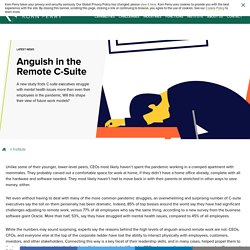
They probably carved out a comfortable space for work at home, if they didn’t have a home office already, complete with all the hardware and software needed. They most likely haven’t had to move back in with their parents or stretched in other ways to save money, either. Yet even without having to deal with many of the more common pandemic struggles, an overwhelming and surprising number of C-suite executives say the toll on them personally has been dramatic. Indeed, 85% of top bosses around the world say they have had significant challenges adjusting to remote work, versus 77% of all employees who say the same thing, according to a new survey from the business software giant Oracle.
More than half, 53%, say they have struggled with mental health issues, compared to 45% of all employees. How bad is COVID fatigue? New poll shows lax safety habits. Why increasing organizational resilience to change matters. Organizational resilience is a crucial characteristic of any business.
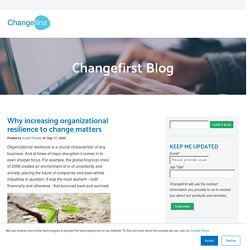
And at times of major disruption it comes in to even sharper focus. For example, the global financial crisis of 2008 created an environment of in of uncertainty and anxiety, placing the future of companies and even whole industries in question. It was the most resilient – both financially and otherwise - that bounced back and survived. Years earlier and just a few months after the tragic events of September 11, Gartner offered a technology related insight into resilience as representing the next evolutionary stage for organizations to be highly responsive and agile in the face of unforeseen change. Thriving In Sustained Ambiguity. As a strategist, I am very comfortable with ambiguity.
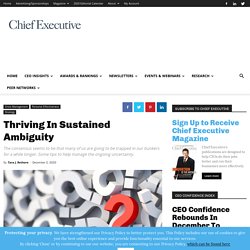
After all, ambiguity is intrinsic to strategy development and execution. Uncertainty is the norm. Entourez-vous de personnes qui n’hésiteront pas à vous TIRER vers le HAUT. Five Fifty: The pandemic’s gender effect. Caring for employee mental health: a coronavirus guide. As the working world adapts to a new normal, caring for employee mental health should be top of business leaders’ priorities.
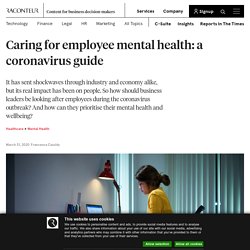
The coronavirus outbreak has shaken everyone, industries and individuals alike. A time of fear and uncertainty has been compounded by a totally new routine - one where everyone who can must work from home. What should business leaders really be doing? The ability of your organisation to weather the coronavirus outbreak lies in its adaptability, resilience and collaborative potential and you will need exactly these traits from your employees. What’s more, those employers who do not prioritise employee mental health and wellbeing are increasingly being called out on social media, potentially damaging their reputation. So what should business leaders really be doing? Mental health campaigner Rob Stephenson agrees, but points out that the duty of care must start with yourself.
Overcoming pandemic fatigue: How to reenergize organizations for the long run. Pandemic fatigue: it’s plaguing organizations and employees right now.
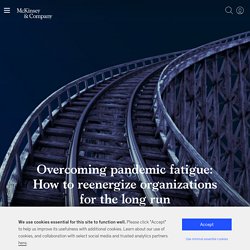
In 2020, we’ve endured a global pandemic, a massive economic crisis, and widespread social unrest. Layer on top of that forces that are fundamentally reshaping societies—technological innovation, business-model disruption, societal inequality, and workforce automation—and it’s clear that an epidemic of stress has been building, with the COVID-19 crisis as the tipping point. When you ask people how they are doing and get beyond the perfunctory answers of “I’m fine” or “I’m managing through it,” a deeper level of challenges emerges: “I’m anxious, overwhelmed, and lonely,” “I’m completely burned out,” “I’ve lost my sense of optimism,” “I’m not sure how much longer I can keep going like this.” These experiences go beyond anecdotes: 75 percent of employees in the United States and close to a third in the Asia–Pacific region report symptoms of burnout.
How to be resilient. Science doesn’t have all the answers on how one becomes resilient, but what we do know is that it requires learning to tap into both inner and external resources.

I’ll touch on some of the most fundamental ones. Connect with others During difficult times, it is common to want to withdraw from the world. This can be for varied reasons, such as feelings of shame, the fear of being judged, or not wishing to be a drain on others. Although there is nothing wrong with wanting solitude during difficult times, it is also important that you stay in touch with people, at least to an extent. Your Brain on COVID-19. At this moment, a savage microbe is holding the human world hostage, forcing nearly 4 billion of our industrious, gallivanting kind into a society of shut-ins.

Confined to our homes—if we’re lucky enough to have them—we’re banding apart, hoping to slow the spread and deprive a greedy pathogen of any more human hosts. covid-19 already has plenty. Listen to an audio version of this story For more audio from The Walrus, subscribe to AMI-audio podcasts on iTunes. Indoors indefinitely, we watch the outside world through our screens. We see New York’s wrapped bodies stacked and refrigerated, army trucks carrying off Italy’s dead, rising curves, health care workers weeping, politicians clinging to poise, and we wonder: Should I buy more canned goods? Your ‘Surge Capacity’ Is Depleted — It’s Why You Feel Awful. Here’s how to pull yourself out of despair and live your life. Talking About Mental Health with Your Employees — Without Overstepping. Executive Summary Like many managers, you probably checked in with your employees throughout last spring when the Covid-19 crisis first started.
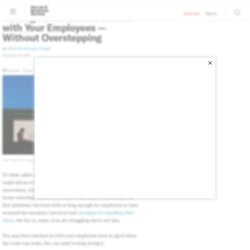
But you need to keep doing it. As the pandemic drags on, there is a rising number of people who are struggling with mental health issues. As a manager, you don’t want to overstep, but you can — and should — open up a conversation with your employees about how they are doing. The author has several suggestions for how to do that, including, talking about health holistically, avoiding making your employees feel like they are “broken,” and actively listening. When will the COVID-19 pandemic end? November 23, 2020 Since we published our first outlook, on September 21st, the COVID-19 pandemic has raged on, with more than 25 million additional cases and more than 400,000 additional deaths.

While the situation looks somewhat better in parts of the Southern Hemisphere, much of Europe and North America is in the midst of a “fall wave,” with the prospect of a difficult winter ahead. Yet the past two weeks have brought renewed hope, headlined by final data from the Pfizer/BioNTech vaccine trial and interim data from the Moderna trial, both showing efficacy of approximately 95 percent ; and progress on therapeutics.
Is an earlier end to the pandemic now more likely? The short answer is that the latest developments serve mainly to reduce the uncertainty of the timeline (Exhibit 1). Support Human Resilience in this New Era. In June of 1833, the Atlantic Journal published, “The world is too big a place for us, too much is going on…Everything is high pressure. Human nature can’t endure much more.” Imagine, in 1833 people felt that the pace of change was a lot to manage. Now, we are changing at warp speed. I believe it’s time to stop talking about change as a disruption and start talking about it as a path for solving our biggest challenges. Resilient leaders persevere amid COVID-19.
As resilient leaders amid COVID-19 and other societal challenges, we must sustain our people, organizations, and society—as well as our own ability to lead—so that we can endure the long road ahead and build trust among all stakeholders. A longer road ahead A few months ago, we imagined “thriving” as leading our organizations to a better normal after the COVID-19 pandemic. Yet our responsibilities as leaders now are further compounded by concurrent challenges of racial injustices, climate change, and economic uncertainties.
Podcast: How businesses can confront the COVID-19 crisis - Actionable insights to help businesses respond and recover. The essence of resilient leadership - Business recovery from COVID-19 - Review, issue 27 (July 2020) Why Your Mindset Around Failure Can Make or Break Your Success. How you mentally frame the inevitable setbacks you face in life is the key to building grit and resilience and ultimately achieving success. Consider Maria Konnikova, who said that reframing setbacks is one of the most important lessons she learned in her two-year journey to becoming a professional poker player. In a recent phone conversation, Konnikova, author of the new book The Biggest Bluff, told me that, prior to learning poker, she had never played a hand of cards in her life. Konnikova has a secret weapon, however--a PhD in psychology.
Success at poker requires skill and luck. Registering a False Positive on Change Resilience. Reframe How You Think About Self-Care. Executive Summary Many leaders tell themselves: “It’s so busy, I can’t afford to…(spend 7 hours sleeping, or stop to get lunch, or keep up my hobbies).” This framing, which casts investments in personal resilience as contrary to the best interests of an organization, is doing both you and your organization a great disservice.
It’s time to take those hackneyed words, “our people are our greatest asset,” to heart. If you are an important asset, how could depriving, devaluing, and depreciating that asset by running it in harsh conditions, powering it with improper fuel, and neglecting routine maintenance possibly be good for your organization? Making sense of the COVID-19 world and finding a new North Star. Apprendre à vivre le moment présent, aussi terrible soit-il. Reskilling the workforce to be resilient. A system that invests not just in workers’ near-term skill needs but also in workers’ long-term resilience can help build long-term organizational resilience in a world where the only constant is change. Reskilling alone may be a strategic dead end. Renewing workers’ skills is a tactical necessity, but reskilling is not a sufficient path forward by itself. The skill shortage is too great.
The investments are too small. The Emotion Archive - How have people around the world coped with the COVID-19 crisis? Helping People Move from Trauma to Growth. ALISON BEARD: Welcome to the HBR IdeaCast from Harvard Business Review. I’m Alison Beard. 2020 will go down in history as a pretty traumatic year for most of us. We had a global pandemic that forced lengthy lockdowns, millions got sick, hundreds of thousands died. Resilience culture: how your company can build one. In testing times, the British are fond of nothing more than a good homily. Whether it’s putting your best foot forward or keeping calm, there’s a distinct sense of carrying on regardless. Post-COVID: A restart or a new start? How to Prepare Yourself for a Return to the Office. Executive Summary While some people are itching to return to their office, many others are feeling anxious about it.
The fear of getting sick, using public transportation, and having no reliable solutions for childcare are just a few major concerns. Bain & Company. We are regularly updating this article with new data on the economy, results of worker surveys about returning to their work sites, and the best safety and worker protection practices we find in and across industries. What Wellbeing Means in the Coronavirus Era. Story Highlights. Post-COVID: A restart or a new start? Former surgeon general Vivek Murthy on a COVID-19 ‘social recession’ As US surgeon general from 2014 to 2017, Vivek H. Reboot: Approaches for leaders to enable a resilient recovery (On demand webinar)
CPE credit is only awarded for participation in the live program, and not the on-demand presentation. Course Description. Lessons in Supply Chain Resilience. COVID-19 shutdown is providing new lessons in corporate resilience. Is Your Culture Resilient Enough to Survive Coronavirus? Navigating to the next normal: The first 100 insights. Managing Stress and Emotions When Working Remotely. Survey: The Deloitte Global Millennial Survey 2020 - Highlights. Leading Through Anxiety. 3 Ways to Turn Crisis Into a Growth Opportunity.
Change and Resilience: An Interview with Prosci Change Advisor Susie Taylor. COVID-19 : Comment protéger votre santé mentale en période de crise. Chaos in Quarantine—What Can I Do About My To-Dos? How to Handle the Pressure of Being a Manager Right Now. How to Refuel When You’re Feeling Emotionally Drained. WaitWhat in partnership with Arianna Huffington’s Thrive Global. Cultivating Resilience in a Pandemic - Podcast. Post-Traumatic Growth: Finding Meaning and Creativity in Adversity. Is Resiliency Enough? COVID-19: Creating Enterprise Systems Resilience. Boris Cyrulnik : "On est dans la résistance, pas encore dans la résilience" 14 EQ Resources for Emotional Health During Coronavirus. Tips for strengthening personal resilience during challenging times. COVID-19 - On protège aussi sa santé mentale à la maison!
Resilient leadership responding to COVID-19. COVID-19: From coping and adapting, to making things extraordinarily better. And surprising ourselves. Resilient Podcast – Special Series on COVID-19. Stay at Home - Work at Home - Be at Home. Build Your Resilience in the Face of a Crisis. What I can and cannot control. COVID-19 : rester sain d’esprit en cinq temps.
Managing the Stress and Uncertainty of Coronavirus. Surviving this crisis will take a shift in mindset. LinkedIn by Holger Nauheimer.